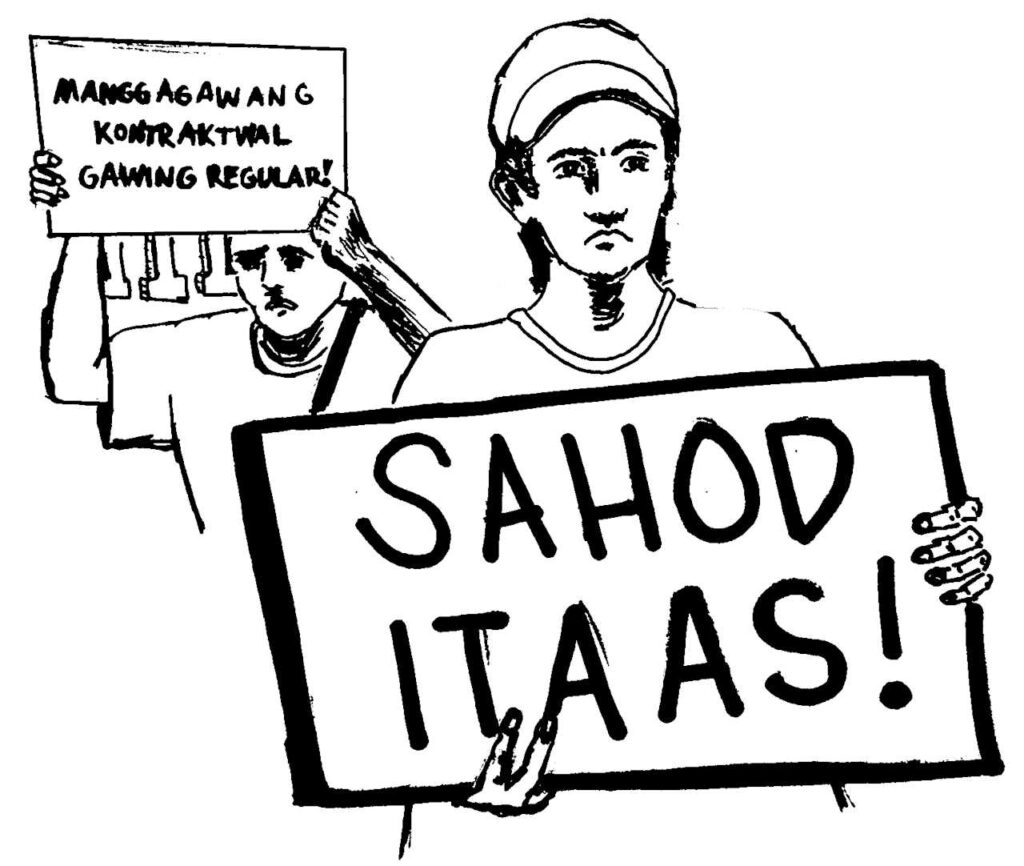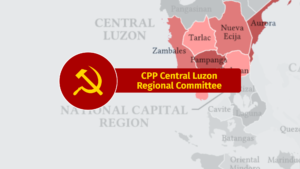Claims against wage increase have long been debunked

Over the past few days, a senate committee has been conducting public hearings on a proposed measly ₱100 increase in the daily workers’ wages. Workers organizations have welcomed the opportunity to place their long-standing demand for wage increases on the national spotlight, especially in the face of skyrocketing prices of food and other basic commodities.
However, amid the public uproar over the Marcos regime’s aggressive push for charter change, it is not unlikely that these hearings are a mere show to placate the broad masses of the people who are indignant over the reactionary government’s waste of time and resources to dance the chacha while ignoring the people’s increasingly dire situation amid crisis.
Representatives of big business organizations have been trying to dominate the current public debate over the matter of wage increases during the past few days by spreading false claims and anti-worker sentiments. These are being buttressed by a few congressmen who wear an economist’s badge on their chest, but who really are mere mouthpieces of big capitalists, who make unscientific and unintelligent claims against wage increases to fool and make workers think that having higher wages go against their own interests.
They raise the specter of “wage increases are inflationary” to sow fear among Filipino workers and silence their clamor. This is a completely baseless claim. Wage increases, per se, do not lead to higher prices. What wage increases automatically lead to are lower profit rates for capitalists. Studies show that raising wages to ₱750 or ₱1,100 per day will lead to a reduction of around 20% to 35% of capitalist profit.
To insist that wage increases will automatically lead to higher prices is to side with the capitalists who want to make easy profits by merely raising prices. If the reactionary government were at all concerned with inflation, they can put their foot down and control prices, especially of key commodities, and compel the capitalists to control their greed. Isn’t this just after all the tax holidays and incentives they have given big capitalists in the past?
If wages were increased, a capitalist can, in fact, choose not to increase his prices, bear the lower rates of profit, in the hope that he can sell more of his commodities or services, capture a bigger market share and possibly make more revenues in the end. Only the lazy capitalists—especially the big bourgeois compradors who have enjoyed government favors and privilege—will insist that they increase their prices automatically with wage increases to ensure that their profits are not reduced by even one percent.
Thus, those who claim that wage increases will automatically lead to inflation are despicable apologists of big capitalist. They bow to the capitalist god of profit, and show contempt for workers whom they do not see as deserving of wages equal to their worth in terms of the value of the food that they and their children eat, the price of education and health care, transportation and communication, and all the other basic measures of decent living.
To counter the demand for wage increases, representatives of big bourgeois compradors, furthermore, pretend to be concerned with the capacity of micro, small and medium enterprises to absorb the impact of paying higher wages. They are cowardly hiding behind the MSMEs to shield their own interests.
In fact, the MSMEs are burdened, not by the wages they pay their workers (who create value and profit for their businesses), but by the overbearing and oppressive weight of the big capitalists and the bureaucrat capitalist state who eat away at their profits in many different ways (raising the costs of land and rent, high rates of taxes and permits, higher costs of imported inputs, unfair terms in subcontracts, corruption, and so on).
Besides, wage orders already typically give exemptions to MSMEs (those with a workforce of less than 10 or 20) allowing them to be exempted from paying mandated minimum under certain circumstances. Many proprietors of MSMEs are more sympathetic to the plight of workers, support the demand for wage increases, and at the same time, raise their own demand for tax exemptions and subsidies to ensure their continued viability.
Marcos’s labor secretary also put forward an utterly stupid and reprehensible proposal, that instead of demanding wage increases, three members of a family of five should find work to enable them to make enough money for their needs. He is completely detached from reality. He displayed his gross ignorance of how working class families have long practiced pooling together efforts to find work and other means of earning money to make ends meet. He is also obscuring the fact there is an acute lack of jobs in the country, due to which, thousands of workers go abroad almost daily to find work overseas, or that millions of workers accept contractual work with below minimum wages, or forced to work without proper wages and under oppressive conditions. If the secretary should really insist on his ingenious proposal, then the state would have to provide workers with free laundry, childcare, daycare and other household services, the absence of which under present conditions compel women workers to stay at home and do unpaid work.
The demand of workers for higher wages is to demand payment matching the costs of their labor power. This is an urgent demand amid an increasingly severe economic crisis marked by a sharp drop in local production, and concomitant rising prices of imported fuel, food and other basic necessities, which has constantly eroded their purchasing power. This has pulled down their quality of life or standards of living characterized by rising debt, lack of savings, reduced food and nutrition, children dropping out of school, lack of access to health care, or to family recreation or entertainment, and so on.
The Marcos regime maintains a policy of cheap labor as a key incentive in his anti-national campaign to entice foreign investors. Serving the interests of foreign monopoly companies and banks, and of local big bourgeois compradors and bureaucrat capitalists, Marcos is employing the state’s military and police forces to intimidate workers, suppress their rights and destroy their unity, to prevent them from effectively fighting for their rights and interests.
History has shown that there is no other way for workers to attain this just demand but to militantly fight for it as one body, by organizing unions, collective bargaining with company management, staging mass actions and waging strikes. The workers movement in the Philippines are persevering to build this strength from the ground in order to unleash the power of the working class to advance their rights and welfare, and join the Filipino people’s bigger national democratic cause.










